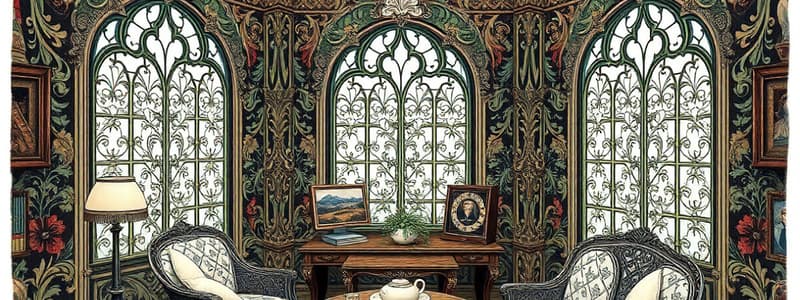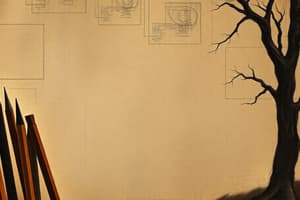Podcast
Questions and Answers
What is the correct proportion of line widths among THIN, MEDIUM, and THICK lines?
What is the correct proportion of line widths among THIN, MEDIUM, and THICK lines?
- 1:4:2
- 1:2:4 (correct)
- 1:3:5
- 1:1:2
Which pencil grade is recommended for drawing THIN lines?
Which pencil grade is recommended for drawing THIN lines?
- 2H grade pencil (correct)
- B grade pencil
- 2B grade pencil
- H grade pencil
When using a bow compass, what is its primary purpose?
When using a bow compass, what is its primary purpose?
- To draw straight lines
- To maintain constant hand pressure
- To check the zero setting of the drafter scale
- To draw smaller circles or arcs (correct)
What precaution should be taken when moving the drafter scale?
What precaution should be taken when moving the drafter scale?
Which statement about the dirt on drawing instruments is true?
Which statement about the dirt on drawing instruments is true?
What is the purpose of the clamping strap in the setup of the drafter?
What is the purpose of the clamping strap in the setup of the drafter?
Which method is recommended for preparing a pencil before drawing?
Which method is recommended for preparing a pencil before drawing?
What angles can be drawn using set-squares combined with a T-square?
What angles can be drawn using set-squares combined with a T-square?
Where is the title block typically located on a drawing sheet?
Where is the title block typically located on a drawing sheet?
What is one recommended tip for achieving good quality drawing?
What is one recommended tip for achieving good quality drawing?
What is the recommended width of each row in the title block commonly used in engineering colleges?
What is the recommended width of each row in the title block commonly used in engineering colleges?
What should be avoided during the drawing process for better results?
What should be avoided during the drawing process for better results?
To correctly secure the sheet to the board, how should Clip 2 be positioned?
To correctly secure the sheet to the board, how should Clip 2 be positioned?
What should be avoided when dimensioning in technical drawings?
What should be avoided when dimensioning in technical drawings?
What is the recommended distance for dimension lines from the object line?
What is the recommended distance for dimension lines from the object line?
When is it acceptable to place dimensions in a sectioned area?
When is it acceptable to place dimensions in a sectioned area?
What should be done if the space between two extension lines is too narrow?
What should be done if the space between two extension lines is too narrow?
Which of the following methods is suggested for dimension placement when space is limited?
Which of the following methods is suggested for dimension placement when space is limited?
What is the primary application of a continuous thick line in technical drawing?
What is the primary application of a continuous thick line in technical drawing?
What type of line is primarily used for center lines in a drawing?
What type of line is primarily used for center lines in a drawing?
Which of the following ratios correctly describes the proportion of long dashes to short dashes in a dashed medium line?
Which of the following ratios correctly describes the proportion of long dashes to short dashes in a dashed medium line?
What should be avoided when executing lettering in a drawing?
What should be avoided when executing lettering in a drawing?
Which application is associated with a continuous thin line?
Which application is associated with a continuous thin line?
What is the height of letters in a single line required to be?
What is the height of letters in a single line required to be?
How should letters be drawn regarding corners?
How should letters be drawn regarding corners?
What type of line is a cutting plane line typically represented by?
What type of line is a cutting plane line typically represented by?
What is the advisable height for titles in pencil drawings according to BIS recommendations?
What is the advisable height for titles in pencil drawings according to BIS recommendations?
How is the body height of lowercase letters determined?
How is the body height of lowercase letters determined?
What is the recommended spacing between the numerator and denominator in a fraction?
What is the recommended spacing between the numerator and denominator in a fraction?
Which height-to-width ratio is commonly observed in letters?
Which height-to-width ratio is commonly observed in letters?
What element is drawn perpendicular to an object line in dimensioning?
What element is drawn perpendicular to an object line in dimensioning?
What must be true about the lines drawn between any two extension lines?
What must be true about the lines drawn between any two extension lines?
What is the primary relationship between letter height and line width?
What is the primary relationship between letter height and line width?
At what angle should inclined letters be sloped from the horizontal?
At what angle should inclined letters be sloped from the horizontal?
Flashcards are hidden until you start studying
Study Notes
Setting Up the Drafter
- Carry the drafter gently, placing the clamping strap at the top left corner of the board to ensure proper alignment.
- Loosen the scale screw to align the 0-degree mark on the degree scale with the scale plate mark.
- Align the bottom edge of the sheet with the horizontal scale, using Clip 1 to pivot the sheet as needed.
- Fix the sheet's position by adding Clip 2 near the bottom left and Clip 3 near the top right corners.
- Secure the top left corner of the sheet with a drawing pin or adhesive tape.
Preparing Drawing Instruments
- Use a penknife or sharpener to remove the wooden shell from the unlettered end of the pencil.
- Set-squares and T-square are useful for drawing lines at specific angles such as 15°, 30°, and 45°.
Drawing Margins and Title Block
- Margins protect drawings from damage at sheet edges.
- Title block, located in the bottom right corner, typically contains crucial information and adheres to standard dimensions (9 mm width and 7 mm height for lettering).
Tips for Quality Drawing
- Regularly sharpen pencil tips using a penknife or sandpaper.
- Use appropriate pencil grades (H, 2H, HB) and minimize eraser use.
- Draw lines, circles, or arcs in one stroke, maintaining consistent hand pressure.
- Ensure the drafter scale zero setting is checked regularly; prevent rubbing against the drawing sheet during movement.
- Ensure cleanliness to avoid stains from instruments and hands.
Lines in Technical Drawing
- Lines form the basic elements of drawing and can be classified into thick, medium, and thin categories of varying widths.
- The preferred line thickness proportions are 1:2:4, with a recommended group of 0.25 for pencil drawing.
- Use harder pencils (H grade) for thick and medium lines and softer pencils (2H) for thin lines.
Line Types and Applications
- Continuous Thick Line: Used for visible outlines and object lines.
- Continuous Thin Line: Utilized for projection lines, dimension lines, and extension lines.
- Dashed Medium Line: Represents hidden lines.
- Chain Thin Line: Serves as center lines, with a 6:1 ratio of long to short dashes.
- Cutting Plane Line: A chain line, thicker at ends, indicating cuts in the drawing.
Lettering Standards
- Lettering should be simple, avoiding artistic styles; symmetrical drawing around vertical or horizontal axes is preferred.
- Letters must have uniform heights within a single line, typically using vertical capital letters.
Letter Heights and Ratios
- Recommended letter heights from BIS are 1.8 mm to 20 mm, correlating with drawing sizes.
- Lowercase letters should maintain a height of 0.7 times that of capital letters, with 0.3 for their tails or stems.
- Maintain consistent spacing between letters and words, generally equal to the letter height.
Dimensioning Essentials
- Dimensions indicate size and are essential for understanding drawings.
- Dimensioning elements include extension lines, dimension lines, leader lines, arrowheads, and dimensions.
- Extension lines should start near the object lines, while dimension lines remain parallel and distanced appropriately.
- Avoid redundancy by ensuring each dimension appears only once, and avoid dimensioning hidden lines.
Studying That Suits You
Use AI to generate personalized quizzes and flashcards to suit your learning preferences.




